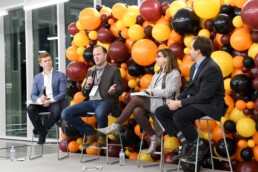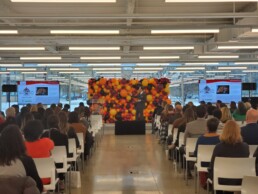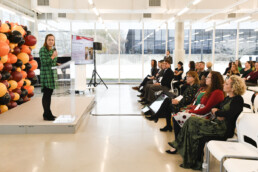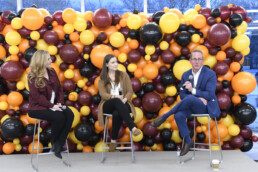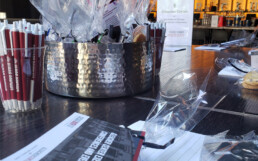How to Keep Attendees Engaged Before Your Event
February 10, 2020Attendee Engagement
Creative Ways to Communicate and Interact - Before Kickoff

As an event planner you've no doubt learned a few tricks when it comes to interacting with the public to promote your event. Sure, your marketing team likely has a hard-hitting strategy in place, but take a moment to ask yourself, "What really will make pique interest?" Chances are, what worked five - or even two - years ago isn't quite catching the eye of your audience, so your attendee engagement today has to be just as amazing as your event agenda and catering menu to get people excited and in the seats.
When it comes to the event planning industry, we've seen it all - the blanket email blasts, the social media shout-outs - but in a world that revolves around an inbox of promotional emails and social media posts, is your current communication strategy the most efficient for keeping you top of mind to your audience? Understanding best practices for maintaining streamlined and consistent engagement strategies and how they help to keep interest levels high is a priority in the event planning space.
Read on for some creative ways to make sure your message doesn't get lost in the shuffle:
Ask For Feedback And Ask It Often
Who doesn't like feeling included in the planning of something great? Engaging with attendees through surveys, polls, and even quizzes not only offers and interactive means to gather audience data and new ideas, it allows your audience to feel like they have a stake in the outcome of the event - meaning a more engaged audience on site!
Set up short polls on Facebook and Twitter, create an online quiz, and send surveys via email in the months leading up to your event. You'll be surprised at the amount of valuable feedback you'd be missing out on by not asking!
Content is King
While much of your database may consist of previous event attendees and engaged email subscribers, how are you promoting your upcoming event to brand new eyes? Creating engaging, organic content through a series of blog posts, LinkedIn articles, and guest posts on sponsor websites is an effective way to boost engagement with potential attendees who are searching for specific industry-related content. Respond to comments and lead impromptu discussions with your audience to keep them interested.
People trust industry experts, so positioning yourself as a thought leader on your event topic makes you and your event even more reputable than you already are - and who doesn't want that!
Give Registrants a Means to Interact Before the Event
Promoting an event doesn't stop at a catchy event hashtag. We live in an age where we can communicate with whomever we want anytime we want - so give your attendees a way to network with one another before they sit down to listen to the Keynote speaker! Consider using a LinkedIn group, a slack thread, or even better use an online event management system. Give your attendees access to event FAQs, networking with fellow industry professionals and solution providers, and a place where they themselves can post questions to their counterparts. Creating this buzz ahead of your event is a creative way to add an air of excitement for what's to come on site.
Say Hello - Face To Face!
Give attendees a sneak peek into the content of your event by hosting a webinar! Ask one of your speakers to host it and focus on a topic or two to discuss with your audience, complete with Q&A and a chat panel. Your webinar attendees will appreciate getting an inside look into their investment and you'll be able to use that data to tailor future marketing messages to them leading up to your event. A small taste of what's to come can be enough to keep your attendees talking not only to you, but to their colleagues and cohorts too. And who doesn't love a few extra registrations?
______
Getting creative and having fun with your audience sets the precedent that your event is one of a kind, while opening the lines of communication with you and their fellow attendees ahead of event kickoff. The work you put forth engaging your attendees ahead of your event will help facilitate livelier discussions and more interaction once they're on site - and that's an event planners dream!
Original post featured on Expo Pass.
Planner Profile: Q&A with Valerie Luporini
January 7, 2020Event Professional Profiles
 Valerie Luporini is the Vice President of Corporate Events at Inland Communications, Inc. and a seasoned meeting and events professional that spans more than 25 years. Her expertise, creativity, and experience is admired by the planning industry and she has shared that insight with us! Check out our first Planner Profile below:
Valerie Luporini is the Vice President of Corporate Events at Inland Communications, Inc. and a seasoned meeting and events professional that spans more than 25 years. Her expertise, creativity, and experience is admired by the planning industry and she has shared that insight with us! Check out our first Planner Profile below:
What meetings and events trends do you see taking off in 2020?
Sustainability - I believe sustainability is becoming the norm in our industry instead of the exception. In the past, it was nice to see recycling bins at an event, it showed that the host cared about the environment. Now, I'm happy to say, attendees are expecting sustainability to be a priority. From full-service apps that create paperless events to zero-waste lunches this trend is being taken seriously.
Experience Based Events and Venues - Creating an event that offers a new experience to attendees is now necessary to hit registration goals. We're living in a world where I believe the average attention span is less than 8 seconds and everyone is looking for instant gratification and constant stimulation. A meeting in a hotel ballroom with classroom seating and a detailed PowerPoint presentation is no longer productive. Event spaces need to be unique and planners need to create an interactive experience to maximize audience engagement and content retention.
Mindfulness -Â I'm personally very excited about the mindfulness trend growing in our meeting and events industry. Whether it's a short meditation, group run or an entire platform for larger meetings, mindfulness is front and center and attendee feedback has been overwhelmingly positive. Helping the attendees disconnect from their everyday allows them to be more engaged.
What has been your biggest challenge in the meetings and events industry?
Working with tight budgets and short turnaround times has been a challenge throughout my career. More recently, my biggest challenge is finding new venues that can provide different experiences for my attendees.
What is your biggest career highlight?
I have been blessed with a great career and have planned hundreds of events over the past 30 years. The one that will always standout for me is an international board meeting. I was a young planner and was tasked with hosting a week-long board meeting for members and their guests. There were many components and challenges that came with this event. Not only was it an international meeting for an elite group but it had multiple sessions running simultaneously. Meeting content had to be developed, normal logistics had to be coordinated and managed and excursion options had to be offered. One of the highlights from that project was using a set of famous stairs as the venue for our black-tie event at the end of the program.
What is your best advice for a newcomer to the planner industry?
I always tell new planners to choose an industry that they are passionate about and develop their planning skills within that space. If they like health and fitness, they should find a company that can use their skills and plan within that world. A good planner can make their skills work in any industry but it's important to keep their passion alive. They should work in an industry they love.
How did you get started in planning meetings and events?
When I was 10 years old, I asked my mom if I could help with my little sister's birthday party. As soon as she said yes, I started planning. I came up with a theme, handmade all the invitations, worked on designing the event (made decorations), and enjoyed watching it come together on the day of her party. Although it was put on hold for several years, my passion was discovered.
I was hired by Cirrus, a division of MasterCard International, to assist the Vice President shortly after I graduated high school. One of the main components of my job was planning meetings and events. The passion that started when I was a kid came alive again. I immediately started planning domestic and international meetings as well as corporate events and marketing programs. Almost 30 years later, I still love what I do.
What tools or technology do you love that can help other planners?
I believe our relationships and the skills to develop them are the most important tools we have as planners. Technology is always changing, so the best advice I can give is to commit to working with peers and suppliers to help you stay informed.
If I had to pick one technology component, I'd say registration software. I have used a few throughout my career and now more than ever the process needs to be easy, quick and secure. It's important to spend the time to research the multiple products that are available and work with peers to choose the one that best fits the project and budget.
What is the most interesting event idea that you've heard about or implemented yourself?
I am amazed every day when I open my email and see all of the events that our peers produce. I recently attended Salesforce's annual Dreamforce conference and have to say I've never attended anything like it. Their attention to detail when planning the attendee experience was noticed and appreciated. They hosted over 170,000 registered attendees for this multi-day event and did it seamlessly. I loved the idea that they aligned it with their corporate core value of making a difference in the world and provided an environment that addressed the mindfulness trend through programing and extreme sustainability efforts. I felt that they provided an engaging, educational and entertaining experience that allowed each guest to maximize their experience and time out of the office.
What is the most important element to a meeting or event and why?
For me it will always be the overall attendee experience. Strong content doesn't mean a successful event. Time is our greatest commodity and with so many options we need to make sure we're hosting and attending events that offer the best return on our energy. If someone is taking time out of their busy schedule, they should be offered easy registration and an engaging event with an environment that makes it easy to retain the information that shared.
10 Event Trends for 2020
January 3, 2020Event Trends and Tips
New decade, new trends! From innovative technologies to catering to a greater audience, the meeting and event planning space is rife with new ways to stand out. Here are 10 trends to keep an eye out for in 2020:
Innovative Eventtech
New registration tools are making events easier and more manageable onsite. Companies like ExpoPass eliminate the frustration of scanning tickets, looking up registration accounts, and even printing name badges.
App Adoption
App usage for events has significantly increase in the last year, and many event professionals see apps as an added value to the event. Having one place to provide site maps, distributed information, FAQs, and more makes navigating the event easier for both attendees and managers alike.
Offering a Tourist Attraction
Expecting out-of-towners to attend your event - Offering an offsite activity, day trip, or unique outing is attractive to registrants and will keep them coming back year after year.
Asking for Feedback
Gone are the days of a paper survey that may or may not get tossed in the trash. Digital post-event surveys through an event app or via email help planners increase feedback from both attendees and sponsors and make it easier to calculate analytics and find trends.
Charity Components
Creating an environment that unifies attendees and sponsors is key in making a memorable experience and more and more planners are implementing a charitable component to the events. Donation drives, offsite volunteering, and trips to witness local culture are more prominent.
Offering Exclusivity
Unique venues can make or break an event, and giving attendees an experience through location is on the 2020 horizon. Luxury resorts, cruise ships, and festival-style events are great ways to make your event a must.
Be Sustainable
The well-being of the environment is top of mind for 2020, and event planners will be making bigger strides in making their events more sustainable. Planners are considering sustainable transportation, recycling options, digital forms of paperwork, solar energy and more.
Make Decor Part Of the Interaction
Key placement of decor and furniture can actually help facilitate mingling and promote the ultimate goal of the event - networking and interaction! Filling large spaces with couches, tables, and even interactive games will be key to the ultimate comfort level of guests.
Cool Eats and Treats
Who doesn't love a fun ice luge or a beautiful carving station - Creating an "exhibit" with the food is a great way to add visual excitement to something you'd already have on site anyway. Interactive food stations like food trucks or build-your-own bars will also be making a splash in 2020.
Make It Personal
A draw for many is the locale itself and ensuring that your attendees have a taste of local culture is super-important. Sourcing local vendors for decor, transportation, and venue space can make all the difference in your event standing out, as well as local menus (Are you hosting an event in Chicago - Maybe one meal consists of local favorites like deep dish pizza and Italian beef!)
Cannabis Legalization and It's Effect on Event Planning
January 2, 2020Marijuana and Events
As we enter into a new decade, the legalization of marijuana continues to be a hot topic of discussion, particularly among meeting and event planners. As of January 1, 2020, Chicago has legalized marijuana and dispensaries are popping up all over the city. At PlannerPalooza in November, we were joined by experts in the cannabis industry who weighed in on how these new laws will affect planners, venues, and vendors. Here are three things to keep in mind when planning an event in a marijuana-friendly environment:
Know Local Laws
As it stands right now, 11 states have full-scale medicinal and recreational marijuana laws in place, while 33 states have legalized marijuana for medicinal purposes, according to panelist Donna B. More, Partner at Fox Rothschild LLP. Because there tends to be so much gray area with what is classified as medicinal or recreational, it is important to understand the local laws for the cities and states for the event you are planning. Hotels may not support the addition of a marijuana feature on-site, and you may need to acquire a license to host such an event said More. In addition to licensing, look into insurances that may be needed either at the venue or for a one-off event. Insurance companies are becoming increasingly more comfortable with insuring the marijuana industry. Also, understand the importance of signage and distributed information as local laws dictate; making health claims, for example, is typically illegal.
Consider the Overall Audiences
From attendees to your sponsors, make sure you know your audience inside and out when bringing on a weed feature at your event. Panelist Doug Lambert, Managing Partner at Scale Momentum, LLC noted that it's important to research other brands and sponsor representation prior to embarking on a marijuana feature or activation at the event since other brands may not be on board with the association of marijuana at the event. Panel moderator Ryan Crane, CEO of Tempo, said that the recent uptick in brands evolving into marijuana-friendly will almost certainly dictate a larger number of events that will house weed-based activations, particularly the food and beverage, retail, and cosmetic industries. Provide resources for your audience so that they can become aware of laws, regulations, and opportunities surrounding new legalizations.
Employ the Right People on Site
An event cannot function without a committed staff of employees to help with logistics. When bringing a weed activation or feature into the mix, it is important to have the right people in place to streamline legalities and any potential issues. To ensure that all bases are covered, More suggested teaming up with the venue to ensure that their general counsel okays the presence of a cannabis company on site (or any giveaways they may have), as well as signing on the lawyer of said company. She noted that cannabis companies also have a wealth of resources to keep themselves covered, and are often willing to provide those resources to partners.
In Case You Missed It: PlannerPalooza 2019
December 9, 2019PlannerPalooza! 2019,Marijuana and Events,Attendee Engagement
 Planner Master Class hosted its first-ever PlannerPalooza event on November 13, 2019 where nearly 200 meeting and event planners, Chicago's hottest vendors and venues, and industry experts gathered to share ideas, network, and discuss business and partnership opportunities.
Planner Master Class hosted its first-ever PlannerPalooza event on November 13, 2019 where nearly 200 meeting and event planners, Chicago's hottest vendors and venues, and industry experts gathered to share ideas, network, and discuss business and partnership opportunities.
The event, held at Kaplan Institute, consisted of two sessions of rapid-fire pitches from vendors and venues including restaurants, nightlife, venues, transportation, entertainment, and more.
After 10 rapid-fire pitches to kick off the event, meeting and event planners had the opportunity to sit in on a choice of two expert panel discussions. The first panel discussion, titled "Follow the Money: Trends in Procurement & Vendor Relationships" was moderated by Jackie White, Director of Events & Conference Services at the Illinois Institute of Technology. Industry experts who offered their professional insight included Bailey Shultz, Account Manager of Sourcing at NHS Global Events and Jay Weidner, Managing Partner of On The Scene. The second discussion, titled "Innovation in Events: Planning Through Production" was presented by Convene, and was moderated by Maria Dillon-Kemp, Vice President of Marketing at Convene. Expert panelists included Taylor Podgorny, Event Production Designer of Frost Chicago, Casey Crisenbery, Art Director of Agency EA, Annie Eaton, CEO of Futurus, and Sean Thorndike, Director of Business Development of CSI DMC.
Meeting and event planners heard from 10 more venues and vendors during rapid-fire pitches before the final panel discussion, titled "The Green Rush: Weed Legalization and Its Effects on Meetings & Events", moderated by Ryan Crane, Founder and CEO of Tempo. Panelists included Donna B. More, Partner at Fox Rothschild LLP, Josh Schonwald, award-winning journalist and futurist at PlanetWise Communications, and Doug Lambert, Managing Partner at Scale Momentum, LLC.
The event culminated with networking and refreshments sponsored by Motor Row Brewing and City Winery.
PlannerPalooza Vendor Presentations
November 25, 2019PlannerPalooza! 2019

From venues and catering to entertainment and services, PlannerPalooza was teeming with some of Chicago's hottest businesses in the meetings and events industry. Attendees included nearly 200 meeting and event planners who had the opportunity to hear short presentations from 20 businesses, as well as expert panel discussions on the most top-of-mind industry topics. Take a look at each of the vendor presentations for more information like pricing, capabilities, offerings, and key contact information when you partner with these businesses:
Aries Charter Transportation, Inc.
Hospitality & Tourism Summit Chicago
If you would like to connect with any of the panelists from PlannerPalooza, just click here!
3 Tips for Maximizing Procurement and Vendor Relationships
November 25, 2019Venues,Risk Management,Event Trends and Tips
The first step in any great event is, well, finding a place to host it! Any good event planner knows that finding the perfect venue and developing a relationship with the venue - s sales team, marketing department, and catering team is imperative to the outcome of the event. We spoke to three successful Chicagoland event planners at PlannerPalooza! and got their best tips for maximizing procurement strategies and vendor relationships.
Details, Details, Details!
Leave no stone unturned - a detailed RFP is your friend says Bailey Shultz, Account Manager for Sourcing at NHS Global Events. Shultz says that a detailed RFP is helpful for a few reasons; in a saturated market, distinguishing your business from others is necessary, too few details make you a less desirable candidate and will not elicit a response, and small details help to determine an accurate budget. Jackie White, Director of Events & Conference Services at Illinois Institute of Technology, says that identifying and including all of the - what ifs - and potential acts of God that could take place in a particular city will help both parties build a strong foundation ahead of an event.
Make It Personal
What better way to build a relationship with a venue than to actually get to know the people behind the title - White says that taking the time to get to know a vendor on a personal level has helped her to build lasting and mutually beneficial professional relationships. Perhaps a sales manager at a catering company just got married or has a birthday coming up; a card in the mail or a small gift is a meaningful and personal touch that will help you remain top of mind in the future. Jay Weidner, Managing Partner at On The Scene noted that taking the extra step in finding what the client truly wants and identifying their objectives will show that you - ve done the due diligence in ensuring the event is successful. Weidner also said that you may find that the client is not always the stakeholder and their ultimate objectives may be different. Get to know the people you - re working with on a more personal level to better define their goals!
Money matters in the event industry! Vendor relationships rely heavily on efficient spending and saving. Weidner says that it - s now more important than ever to find the main items that clients are NOT making money on, and find a workaround to monetize those. Maybe they aren - t making money off of name badges or transportation; a sponsor can offset those costs and either save the client money with in-kind sponsorships or earn money with a paid sponsorship. White suggests finding out if the sales team of one of your vendors is trying to reach a bonus or a perk; if they are, work out a mutually beneficial contract that helps save your client some money and the sales person reach their quota.
Sources: -
Jackie White, Director of Events & Conference Services
Illinois Institute of Technology
Jay Weidner, Managing Partner
On The Scene
Baily Shultz, Account Manager - Sourcing
NHS Global Events
4 Non-Traditional Venues Planners Are Loving Right Now

Sometimes the hallmark of a great event is a memorable venue - a place that attendees may have never attended, a unique space local to the host city, or a fun spot that offers the opportunity for interaction. As meeting and event planners work to find new ways to make their events more exciting and stand apart from run-of-the-mill banquet hall settings, non-traditional venues are seeing a spike in meeting and event activity.
We discussed this very topic at a recent Planner Master Class with nearly 100 meeting and event planners. Here are 5 types of non-traditional venues that meeting and event planners are loving right now:
Sports Stadiums
Many professional and college sports stadiums have ample space for larger groups and the planners we spoke to have taken full advantage of that space! Field-view banquet rooms can be set up in a plethora of ways and the stadium can often provide the catering on-site. One planner at the Planner Master Class hosted a meeting at Wrigley Field on a non-gameday and as an added bonus, was able to offer her attendees a tour of the stadium as well. Another planner utilized Lambeau Field in Green Bay, Wisconsin for a corporate seminar; in addition to the main general assembly, she was able to sell sponsors the smaller suites at VIP level to later use as smaller breakout networking sessions.
Breweries
The meeting and event planners we spoke with agreed that food and alcohol is often a significant draw to getting people to attend their events in the first place. That being said, breweries have proven to be a great venue for events! Not only do breweries often have space large enough for a big group, the added benefit of offering brewery tours and tastings makes for a unique and memorable event experience. Many breweries can offer their own catering on site, and spaces without a kitchen are usually open to outside catering, according to a number of planners at the Planner Master Class.
Museums and Galleries
Looking for a venue with character but don't want to provide your own decor? Check out event space at museums and art galleries! Already decorated beautifully, these venues are a unique break from sterile-looking banquet rooms that your attendees will love. One planner at the Planner Master Class held an event at the Cleveland Rock and Roll Museum and saw a jump in attendee registration when the venue was announced. Another planner noted that many local attendees may not go to galleries or museums in their spare time, so it's fun for them to have an 'excuse' to check out new exhibits and spend time in a local landmark.
Cruise Boats
It doesn't get more non-traditional than a venue on the water! A surprising number of Planner Master Class attendees have hosted meetings and events on large cruise boats. Planners agreed that the outdoor environment inspires a fun, exciting attitude going into the event and helps to maintain positivity throughout. Attendees have loved the open space, nautical themes, and interesting concept, and planners have loved the ease of organizing as cruise boats have on-site catering and staffing.
5 Ways Planners Are Elevating The Overall Event Experience
October 10, 2019Attendee Engagement,Event Trends and Tips

For years the event standard included a beige room with beige furniture, white linens, a plated chicken dish, and speaker after speaker at a podium. While the element of consistency held up for quite some time, the past few years have pushed meeting and event planners to think outside the box when it comes to creating an innovative event experience.
At a recent Chicago Planner Master Class, event innovation was heavily discussed by more than 75 experienced meeting and event planners during roundtable discussions. Here are five exciting ways that meeting and event planners are getting even more creative with their event experience:
1) Better Food, Better Event
Remember that plated chicken dish? According to our discussion groups, it's done. Meeting attendees are now expecting more for their time and their registration fee and it starts with the food. Our planners have integrated more local cuisine into their event menus; if the event takes place in Chicago, deep-dish pizza, cheesecake, and a sizzling steak can be part of that. Even how food is being served is changing and becoming an experience rather than a logistic; food trucks, 'Instagrammable' platings, build-your-own experiences, and even classes where attendees learn how to cook a local meal have taken over as popular, memorable event meals.
2) More Things To Do - Besides Sitting in a Chair
Gathering your event attendees into a sterile-looking room to listen to a multitude of speakers makes for a pretty stagnant event. The meeting and event planners we talked to have been using on-site activations, games, and great keynote speakers to give their attendees something engaging and memorable during the event. One planner hosted a 'Board Member Roast' as part of their welcome session to break the ice and get the event started off on a fun - and hilarious - note. Another planner set up a golf simulator outside of the meeting rooms so attendees could compete with one another during breaks; at the end of the event, the winner received a prize. One planner found that their attendance was higher when they announced that their keynote speaker was an entertainer completely unrelated to the topic of the event.
3) Innovation Starts At Registration
According to the meeting and event planners at the Chicago Planner Master Class, sometimes innovation doesn't mean lots of costly bells and whistles throughout the duration of the event. For many, the art of innovation starts right at the registration table. Oftentimes, the registration process (and the line!) is daunting, boring, and inefficient. Creating a quick and streamlined process kicks off the event in a positive note, especially in the eyes of attendees. One planner mentioned having monitors along the registration queue that played short, dynamic videos about what they could expect throughout the event - a move that was entertaining enough to make the wait seem much shorter while driving excitement and anticipation for the event ahead. Another planner had a team of personnel hand out water and snacks to those waiting in line which offered a personal touch and a way for attendees to get to know the facilitators.
4) Experiences Over "Stuff"
In an age where social media reigns supreme, people are always looking for exciting things to document. Meeting and event planners are leaning more towards fun experiences rather than things when it comes to creating an innovative event. What does this mean exactly? The planners we spoke to have steered away from giveaways like water bottles, T-shirts, and pens, in favor of off-site experiences like local shows, tours of the host city, and a casual post-work activity like renting out a bowling alley or going to a game.
5) Keep The Event Top Of Mind After Adjournment
An innovative event experience shouldn't stop at the close of a door and a flight home. Our planners agreed that some of their most successful events (determined by how many guests are repeat attendees) were ones where a concerted effort was made to maintain communication post-event. Sending out post-event thank you emails, following up with phone calls over the next week, and administering feedback surveys to let guests voice their opinions are all easy ways to make attendees feel valued. According to the planners we spoke to, attendees who felt like their time and opinions were valued will keep coming back because they feel like they played a role in the success of the event.




